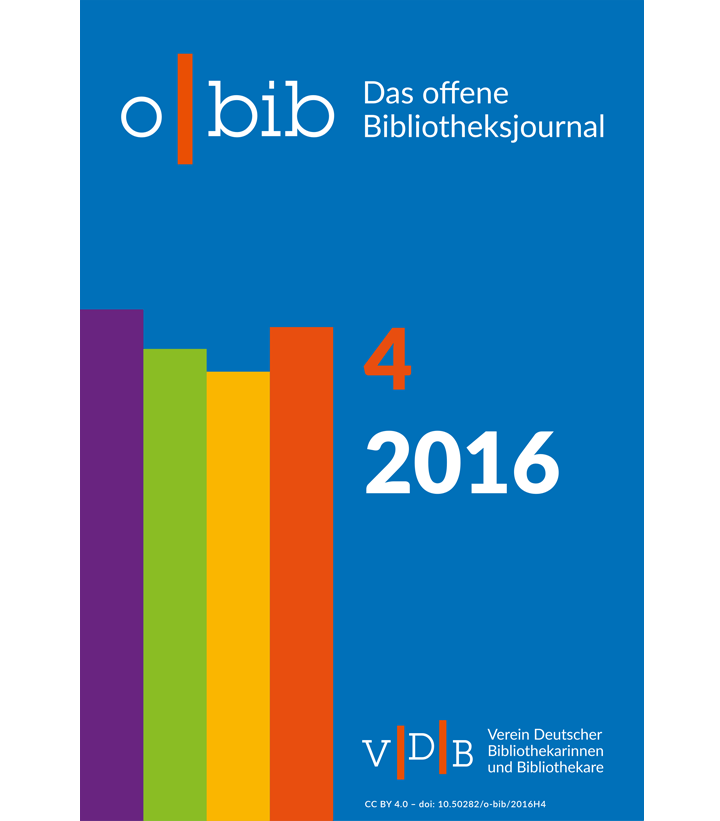An APC Offsetting Model in progress
DOI:
https://doi.org/10.5282/o-bib/2016H4S119-135Schlagwörter:
Allianz-Lizenzen, Hybrides Open Access, Open-Access-PublikationenAbstract
Die Friedrich-Alexander-Universität Erlangen-Nürnberg (FAU) betreibt seit Oktober 2010 einen DFG-geförderten Open-Access-Publikationsfonds und dokumentiert u.a. auch spezifische Ablehnungsgründe
bei Förderanfragen: Am häufigsten werden dabei Anträge zur Finanzierung von hybriden Open-Access-Publikationen gezählt. Das Interesse der Wissenschaft an diesen ist vorhanden und
ausgeprägt. Hintergrund der Ablehnung ist das Problem des sogenannten Double Dipping, d.h. die doppelte Belastung des Wissenschaftssystems sowohl durch Subskriptionsgebühren als auch durch Article processing charges (APC). Um den Interessen der Wissenschaftlerinnen und Wissenschaftler sowie der DFG Geltung zu tragen, bemüht sich die Universitätsbibliothek um den Abschluss transparenter APC-Offsetting-Modelle. 2013 begann hierzu eine Kooperation zwischen der Universitätsbibliothek, dem Department Chemie und Pharmazie der FAU und der Royal Society of Chemistry
(RSC) im Rahmen des „Gold for Gold“-Modells. Die Universitätsbibliothek Erlangen-Nürnberg führte eine Vorabkalkulation für das Modell durch und präsentiert im Folgenden die Ergebnisse sowie die Integration des Vouchersystems in den internen Workflow. Daneben liefert RSC Zahlenmaterial aus nationalen Auswertungen: Beispielsweise wurden 2014 ca. 950 Voucher an die beteiligten Institutionen übermittelt. Bei einem vollständigen Einsatz könnten durch diese Voucher ca. 60 % aller
publizierten RSC-Artikel mit deutschen Corresponding Authors Open Access gestellt werden, wobei aktuell nicht alle genutzt werden. Der vorliegende Beitrag liefert entsprechende Empfehlungen zur
Steigerung der Akzeptanz von Open-Access-Vouchern.
In October 2010, Friedrich-Alexander University Erlangen-Nürnberg (FAU) launched its open access fund, supported and co-financed by the German Research Council (DFG). As the manager of the fund, the University Library has to report to the DFG. The reporting also includes the reasons for the refusal of grant applications: These refusals mostly concern articles in hybrid open access journals, in which scientists are highly interested. The reason for having this as a criterion for refusal is the ‘double dipping’ problem. Double dipping means that the academic system hasm to pay double by both article processing charges (APC) for publication and subscription costs, with publishers not providing a proportionate offset. However, in order to meet the needs of the
scientists, the University Library tries to negotiate APC offsetting models which are transparent and protect the interests of the scientists. In 2013, the University Library, the Department of Chemistry and Pharmacy of the FAU and the Royal Society of Chemistry (RSC) started a cooperation with the RSC Gold for Gold model. The present paper examines the model and presents the results as well as the integration of the voucher model into the library workflows. As an analysis
of RSC on a national level shows, 950 vouchers were sent to the participating institutions in 2014. This means that about 60 % of all RSC articles with a German corresponding author could, in theory, be made open access, but in practice not all vouchers were used. The article also makes recommendations how the acceptance of open access vouchers can be raised.
Literaturhinweise
Björk, Bo-Christer und David Solomon. „Developing an Effective Market for Open Access Article Processing Charges.“ Open access publishing (2014). http://www.wellcome.ac.uk/stellent/groups/corporatesite/@policy_communications/documents/web_document/wtp055910.pdf.
Björk, Bo-Christer. „The hybrid model for open access publication of scholarly articles. A failed experiment?“ Journal of the American Society for Information Science and Technology 63, Nr. 8 (2012). http://onlinelibrary.wiley.com/doi/10.1002/asi.22709/abstract.
Finch Group. „Accessibility, sustainability, excellence: how to expand access to research publications.” Report of the Working Group on Expanding Access to Published Research Findings (2012). http://www.researchinfonet.org/wp-content/uploads/2012/06/Finch-Group-report-FINAL-VERSION.pdf.
Gutknecht, Christian. „Transparenz von Subskriptionskosten in der Schweiz.“ 027.7 Zeitschrift für Bibliothekskultur 4, Nr. 1 (2016). http://dx.doi.org/10.12685/027.7-4-1-103.
Jisc. „Principles for Offset Agreements.“ https://www.jisc-collections.ac.uk/Global/News%20files%20and%20docs/Principles-for-offset-agreements.pdf.
Mittermaier, Bernhard. „Double Dipping beim Hybrid Open Access - Chimäre oder Realität?“ Informationspraxis 1, Nr. 1 (2015). http://dx.doi.org/10.11588/ip.2015.1.18274.
Science Europe. „Principles for the Transition to Open Access to Research Publications.“ Science Europe Position Statement (2013). http://www.scienceeurope.org/uploads/PublicDocumentsAndSpeeches/SE_OA_Pos_Statement.pdf.
Swan, Alma. „Policy guidelines for the development and promotion of Open Access.“ Open Guidelines Series (2012). http://www.unesco.org/new/fileadmin/MULTIMEDIA/FIELD/Tashkent/pdf/PolicyGuidelines.pdf.
The Netherlands EU Presidency. „Amsterdam Call for Action on Open Science.” Amsterdam Conference ‘Open Science – From Vision to Action’ (2015). http://english.eu2016.nl/binaries/eu2016-en/documents/reports/2016/04/04/amsterdam-call-for-action-on-open-science/amsterdam-call-for-action-on-open-science.pdf.
Veröffentlicht
Ausgabe
Rubrik
Lizenz
Copyright (c) 2016 Markus Putnings, Sybille Geisenheyner

Dieses Werk steht unter der Lizenz Creative Commons Namensnennung 4.0 International.





